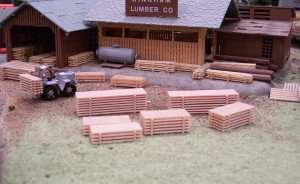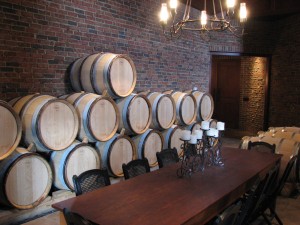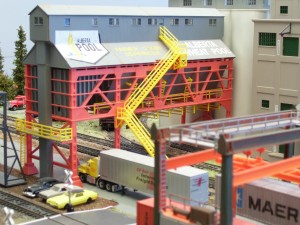
Western Lumber Company
As the Roaring Twenties rolled on Charles assumed more and more of the daily operations of the family’s holdings. Several small nationwide recessions in the Twenties affected businesses in Lake Neccudah. Of particular note was the Western Lumber Mill. Demand for lumber had dropped at a time when the owners had just completed a major and costly upgrade of their equipment. Samuel Dunwell was president of the First National Bank at the time. The mill was cash strapped and about to go under. An emergency meeting of the bank’s board of directors was convened and a plan of action was presented to the mill owners. The bank, through a separate holding company, Lake Neccudah Properties Inc., would assume all of the outstanding debt and funnel enough cash to the mill to meet monthly obligations. In return the owners would relinquish majority ownership, forfeit future profits and stay on as paid operational managers. It was a bitter pill to swallow, but it meant that everyone would keep their jobs and the mill would continue to operate as usual. The new holding company, LNPI, coincidentally, was wholly owned by Samuel and Charles Dunwell. All of Samuel’s vast real estate holdings were now brought under this corporate umbrella.
By 1928 the then 39 year old Charles Dunwell had assumed most of the day to day operations of his father’s mini empire. Seats on the board of directors at the bank, railroad and LNPI kept Charles very busy. Additionally, he oversaw the daily operations of Golden Valley Canning and several small machining businesses in town. In 1933 national prohibition was repealed and the regional hops and barley growers saw a resurgent demand for their crops.

Crown Beverage
This led to the reopening of the Crown Beverage Company as a brewery by Gunther Heinz in 1934. Because of its easy proximity to the barley and hops fields Crown was able to once again secure the rights to produce several national brands of beer. This continued to bring numerous skilled laborers to the area, along with a rich, divergent, middle European culture. As the beer flowed so did the tide of nationalism between old time Irish residents and the newly arriving German and Polish immigrants who manned the brewery As farm mechanization became more affordable in the late 1930’s many of the small area farms were purchased by larger, better funded, agribusiness companies.

Alberta Wheat Pool
This was especially evident when, in 1941, the Alberta Wheat Pool Company was formed by Charles and other area growers to buy out the remaining small farmers and take advantage of the increased productivity and economies of scale that mechanization brought. With each new business that was formed demand for ancillary and support businesses grew. Foundries, tool and die, and machine tool businesses thrived on work provided by the railroad and the agricultural companies.
